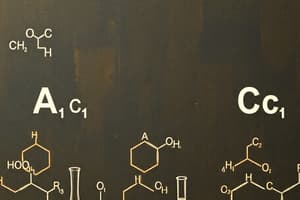Podcast
Questions and Answers
How many grams of NO2 can be formed from 10.0 g of NO if the percent yield of the first step is 35.0% and the second step is 40.0%?
How many grams of NO2 can be formed from 10.0 g of NO if the percent yield of the first step is 35.0% and the second step is 40.0%?
- 2.80 g
- 4.29 g (correct)
- 2.15 g
- 11.5 g
What volume of 1.0 M magnesium chloride solution must be added to produce 20.0 g of precipitate?
What volume of 1.0 M magnesium chloride solution must be added to produce 20.0 g of precipitate?
- 70 mL
- 140 mL (correct)
- 280 mL
- 20 mL
If 50.0 mL of 0.200 M NaOH is required to neutralize 10.0 mL of H2SO4, what is the molarity of the acid solution?
If 50.0 mL of 0.200 M NaOH is required to neutralize 10.0 mL of H2SO4, what is the molarity of the acid solution?
- 1.00 M
- 0.100 M
- 0.500 M
- 2.00 M (correct)
Which equation is classified as a reduction/oxidation reaction?
Which equation is classified as a reduction/oxidation reaction?
What is the density of argon gas at 55.0°C and 765 mmHg?
What is the density of argon gas at 55.0°C and 765 mmHg?
What is the temperature of a gas in a 4.0-L flask reduced to 442 mmHg from an initial pressure of 884 mmHg?
What is the temperature of a gas in a 4.0-L flask reduced to 442 mmHg from an initial pressure of 884 mmHg?
After 45% of H2 leaks from a balloon filled with equal amounts of H2 and N2, what percentage of N2 remains?
After 45% of H2 leaks from a balloon filled with equal amounts of H2 and N2, what percentage of N2 remains?
What volume of 0.75 M calcium nitrate solution must be diluted to produce 1.00 L of 0.45 M nitrate ion solution?
What volume of 0.75 M calcium nitrate solution must be diluted to produce 1.00 L of 0.45 M nitrate ion solution?
How many of the following quantities have five significant figures: 0.1055 g, 53,080 mL, 0.0020 L, 0.0000081200 cm³, 0.00004813 m?
How many of the following quantities have five significant figures: 0.1055 g, 53,080 mL, 0.0020 L, 0.0000081200 cm³, 0.00004813 m?
What is the mass of the second isotopic form of bromine if 79Br has a mass of 78.9 amu and accounts for 50.3% of bromine atoms?
What is the mass of the second isotopic form of bromine if 79Br has a mass of 78.9 amu and accounts for 50.3% of bromine atoms?
Classify the following substances: sweat, carbon dioxide, aluminum.
Classify the following substances: sweat, carbon dioxide, aluminum.
Identify which of the following formulas and names are correct for chemical compounds.
Identify which of the following formulas and names are correct for chemical compounds.
What is the symbol for an isotope containing 82 protons and 122 neutrons?
What is the symbol for an isotope containing 82 protons and 122 neutrons?
How many atoms of oxygen are in 5.0 grams of Ca3(PO4)2?
How many atoms of oxygen are in 5.0 grams of Ca3(PO4)2?
Which of the following describes a pure substance?
Which of the following describes a pure substance?
Which of the following statements correctly identifies a characteristic of isotopes?
Which of the following statements correctly identifies a characteristic of isotopes?
What is the sum of the coefficients when balancing the equation Ca3(PO4)2 + SiO2 + C → CaSiO3 + P4 + CO?
What is the sum of the coefficients when balancing the equation Ca3(PO4)2 + SiO2 + C → CaSiO3 + P4 + CO?
Which of the following is the net ionic equation for the reaction between Ca(OH)2 and FeSO4?
Which of the following is the net ionic equation for the reaction between Ca(OH)2 and FeSO4?
Identify the oxidizing agent in the reaction: 2 NaMnO4 (aq) + 3 Na2C2O4(aq) + 4 NaOH (aq) → 2 MnO2(s) + 6 Na2CO3(aq) + 2 H2O(l).
Identify the oxidizing agent in the reaction: 2 NaMnO4 (aq) + 3 Na2C2O4(aq) + 4 NaOH (aq) → 2 MnO2(s) + 6 Na2CO3(aq) + 2 H2O(l).
Which of the following has the correct oxidation state listed for Mn?
Which of the following has the correct oxidation state listed for Mn?
If a chalcocite ore contains 75.0% copper (I) sulfide by mass, how many kilograms of copper can be extracted from 80.0 kg of chalcocite?
If a chalcocite ore contains 75.0% copper (I) sulfide by mass, how many kilograms of copper can be extracted from 80.0 kg of chalcocite?
What is the volume of 10^6 bacterial cells, given that the volume of one bacterial cell is 3.25 µm^3?
What is the volume of 10^6 bacterial cells, given that the volume of one bacterial cell is 3.25 µm^3?
Convert the rate R = 0.0406 kPa km^-1 to mJ m^-4.
Convert the rate R = 0.0406 kPa km^-1 to mJ m^-4.
Determine the moles of the excess reactant remaining when 12.0 moles of F2 and 7.0 moles of N2 react completely in the equation 3 F2(g) + N2(g) → 2 NF3.
Determine the moles of the excess reactant remaining when 12.0 moles of F2 and 7.0 moles of N2 react completely in the equation 3 F2(g) + N2(g) → 2 NF3.
Flashcards are hidden until you start studying
Study Notes
Exam Overview
- Exam covers Chapters 1-5, involving significant figures, isotopes, chemical classification, formulas, isotopes, stoichiometry, net ionic equations, oxidation states, and gas laws.
- Structure includes two sections: Questions 1-10 are worth 5 points each, Questions 11-25 worth 10 points each.
Significant Figures
- Identify quantities with five significant figures:
- Examples: 0.1055 g (4 sig figs), 53,080 mL (5 sig figs), 0.0020 L (3 sig figs), 0.0000081200 cm³ (6 sig figs), 0.00004813 m (4 sig figs).
Isotopes
- Bromine has two isotopes; ^79Br has 78.9 amu, accounting for 50.3% of atoms.
- Calculating the mass of the second isotope is essential for understanding isotopic distribution.
Pure Substances vs Mixtures
- Classify substances:
- Sweat: Mixture, heterogeneous
- Carbon Dioxide (CO₂): Pure substance, compound
- Aluminum (Al): Pure substance, element
Chemical Formulas and Names
- Important formulas and their names:
- CoCl₂: Cobalt chloride
- P₂I₄: Diphosphorus tetraiodide
- H₂PO₃: Phosphorous acid
Isotope Symbol Notation
- Protons and neutrons determine isotope symbol:
- 82 protons, 122 neutrons give symbols like ^204_82Pb.
Stoichiometry
- Calculate moles of oxygen in compounds like Ca₃(PO₄)₂ and balance chemical equations accurately.
Ionic Equations
- Identify net ionic equations such as the reaction between Ca(OH)₂ and FeSO₄, focusing on actual chemical changes.
Oxidation and Reduction
- Recognize oxidizing agents in chemical reactions, using examples like NaMnO₄.
Gas Law Applications
- Problems related to gas properties, determinations of density, and effects of temperature and pressure.
Solutions and Concentrations
- Calculation of molarity and relationships in neutralization reactions, exemplified by titrations with NaOH and H₂SO₄.
Precipitation and Acid/Base Reactions
- Understand classification of reactions, such as precipitation vs. acid/base theories.
Volume and Concentration Calculations
- Convert between units and calculate volumes needed for certain molarities, applying the dilution equation.
Percent Composition and Yield Calculations
- Work through combustion analysis to determine empirical and molecular formulas from product masses.
Decomposition Reactions
- Analyze decompositions involving complex compounds like XeO₄, applying concepts of yield and purification methods.
Each bullet detail is critical for mastering the relevant chemistry concepts presented in the exam content. Being familiar with these details will enhance understanding and performance on the exam.
Studying That Suits You
Use AI to generate personalized quizzes and flashcards to suit your learning preferences.




